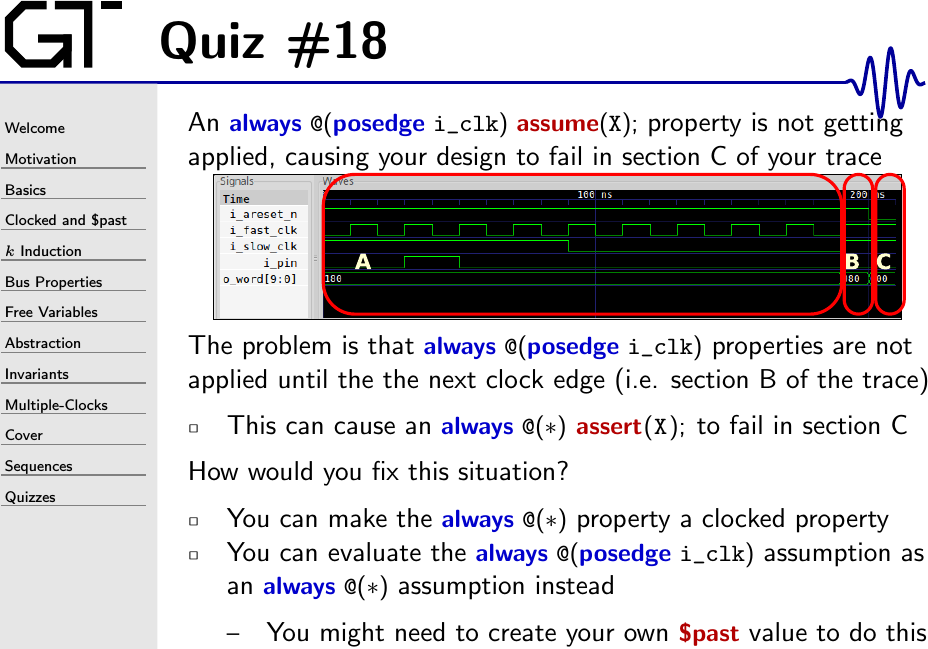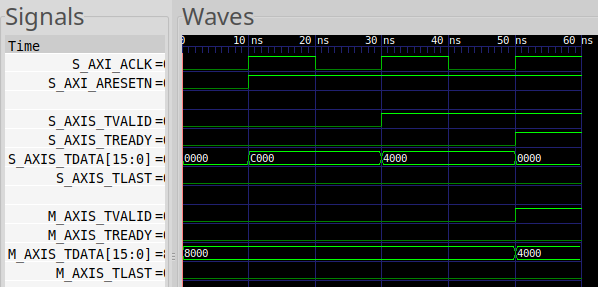Answer to Quiz #18
 |
Perhaps an example might help explain this one.
Suppose you have the following AXI-stream example where you want to forward an incoming AXI-stream (slave) to an outgoing AXI-stream master.
always @(posedge S_AXI_ACLK)
if (!S_AXI_ARESETN)
begin
M_AXIS_TVALID <= 0;
S_AXIS_TREADY <= 0;
end else if (S_AXIS_TVALID && !S_AXIS_TREADY
&& (!M_AXIS_TVALID || M_AXIS_TREADY))
begin
S_AXIS_TREADY <= 1;
M_AXIS_TVALID <= 1;
M_AXIS_TDATA <= S_AXIS_TDATA;
M_AXIS_TLAST <= S_AXIS_TLAST;
end else begin
if (M_AXIS_TREADY)
M_AXIS_TVALID <= 0;
S_AXIS_TREADY <= 0;
endTo make this work, you’d use the basic AXI stream properties. For now, let’s just focus on the input assumptions–although you’d need another set of similar assertions on the master port.
always @(posedge S_AXI_ACLK)
if (!f_past_valid || $past(!S_AXI_ARESETN))
assume(!S_AXIS_TVALID);
else if ($past(S_AXIS_TVALID && !S_AXIS_TREADY))
begin
assume(S_AXIS_TVALID);
assume($stable(S_AXIS_TDATA));
assume($stable(S_AXIS_TLAST));
endThis should be fairly straightforward–you are just forwarding the stream along. Because there’s no skid buffer in this example, the design would be limited to 50% throughput.
This is all pretty basic so far.
Let’s make this a bit more challenging: We’ll insist that the example be “multiclock”–separating the clock itself from the formal timestep. This means that we’ll need some stability assumptions as well–specifically, assuming that input values will only change on a clock tick.
(* gclk *) reg gbl_clk;
always @(posedge gbl_clk)
if (!$rose(S_AXI_ACLK))
begin
assume(!$rose(S_AXI_ARESETN));
assume($stable(S_AXIS_TVALID));
assume($stable(S_AXIS_TDATA));
assume($stable(S_AXIS_TLAST));
assume($stable(M_AXIS_TREADY));
endStill, this remains pretty basic.
One of the consequences of our implementation above, and specifically of not
using a skid buffer,
is that we forward the data to the downstream master and set S_AXIS_TREADY
while the slave is stalled. That means that, on the same clock the
data is accepted, it should already be valid on M_AXIS_TDATA.
Shall we verify this?
always @(*)
if (f_past_valid && S_AXIS_TVALID && S_AXIS_TREADY)
assert(S_AXIS_TDATA == M_AXIS_TDATA);Unfortunately, this assertion will fail with the trace shown below.
 |
Wait, what? Why??
It will fail because the assumption that keeps S_AXIS_TDATA from changing
if the slave is stalled doesn’t get applied until the next clock cycle.
That’s what the picture in the slide above is there to help describe.
In this case, S_AXIS_TDATA will follow its stability assumption in regions
A and B, but not yet in region C since there’s been no clock tick
in region C yet. The clock tick won’t take place for another cycle, pushing
region C into region B.
There are two potential solutions to this problem.
-
We could take the failing assertion and move it from
always @(*)to a test guarded byalways @(posedge S_AXI_ACLK). This may be the simplest fix. This fix would work for this problem.The problem is that I tend to like the
always @(*)criteria. This has forced me into situations where some other assertion elsewhere in the design would take more work to adjust and so I’ve then been constrained to do this the other way. -
The other way is to implement your own
$past()value. Once you see it, it’s easy to do–just annoying. In this case, we might do the following:
reg past_tvalid, past_tready;
reg [DW-1:0] past_tdata;
reg past_tlast;
always @(posedge S_AXI_ACLK)
begin
past_tvalid <= S_AXIS_TVALID;
past_tready <= S_AXIS_TREADY;
past_tdata <= S_AXIS_TDATA;
past_tlast <= S_AXIS_TLAST;
if (!S_AXI_ARESETN)
past_tvalid <= 0;
endOnce you do this, you can then move the stability assertion to a combinatorial block.
always @(*)
if (f_past_valid && past_tvalid && !past_tready)
begin
assume(S_AXIS_TVALID);
assume(S_AXIS_TDATA == past_tdata);
assume(S_AXIS_TLAST == past_tlast);
endThis would also solve your problem.
I should point out, however, that there is a computational penalty to using
an always @(*) formal property in a simulation environment. The problem is
that the property will be re-evaluated every time something it depends upon
changes. (This is normally what you would want …) A property built upon
always @(posedge clk), on the other hand, will only be evaluated on the clock
edge, simplifying the amount of processing required by the simulator. If your
goal, therefore, is to use formal properties with both simulations and formal
methods, it might make more sense to instead convert all of your checks to
@(posedge i_clk).
I’ll let you be the judge.
